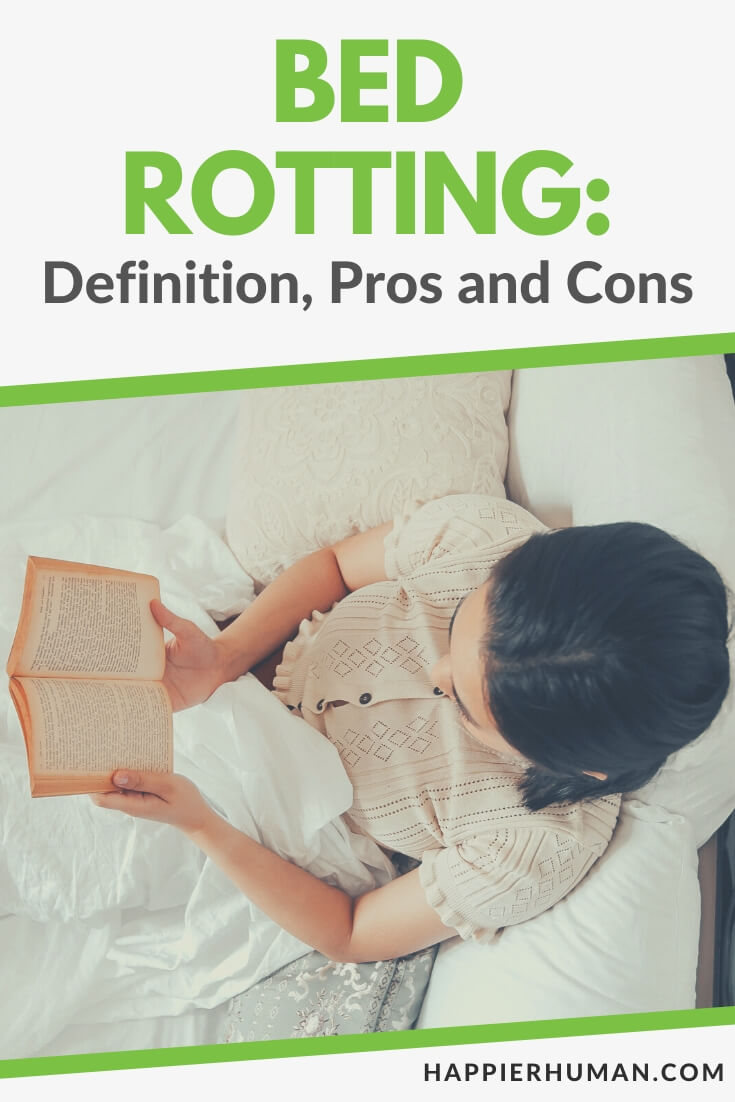For those unfamiliar with the term “bed rotting,” I am sure you are thinking what I was when I first heard it. You had a mental image of an ancient and worn-out mattress. A bed that is dingy and stained with body sweat, and the springs are worn and poke you in the side.
You may have even thought of a mattress that is lumpy and bumpy… a bed so bad, if you slept on it, your back and shoulders would ache all day long. However, that's not bed rotting; that's just a rotten bed.
Bed rotting does not even indicate that you need to buy a new bed.
In this article, you will come one step closer to understanding Gen Z slang because we will define bed rotting. Then we'll discuss the pros and cons of it.
What is Bed Rotting?
Bed rotting is a Generation Z approach to self-care that has been highly promoted on TikTok. Bed rotting is when you choose to spend several hours or all day in bed to recharge mentally, physically, and emotionally. It’s when you listen to your body and schedule times to rest and cope.
There is no specific activity you are supposed to do in bed when it comes to bed rotting. The most common form of bed rotting is lying in bed while burying yourself in your comforter and watching Hulu or Netflix.
Bed rotting can be relaxing with your pet, enjoying your favorite snack, texting your friends, talking on the phone, or browsing social media while in bed.
Additionally, you may post videos or photos on TikTok and other social media sites with the hashtag #bedrot.
There is no limit to what you can do in bed while bed rotting.
When bed rotting, it's not to be confused with your bedtime at night when you usually go to sleep or engage in sexual activity.
Instead, it is a time of decompression… time for you to enjoy downtime, taking a break from school, work, or social engagements.
We live in a society that values busyness as a symbol of status in the eyes of others and is connected to our own self-worth. Unfortunately, it's essential for many of us to feel needed, influential, and valued, so we stay busy by choice.
A few short years ago, status was perceived by a person's money or material possessions. Now, it has shifted to include those who stay busy (hustling to achieve greatness) with little time for leisure.
Then there are those who simply put others before themselves. As a parent, caregiver, or just a caring human being, you are wired to think of others’ needs first.
When those you care for are doing well and have their needs met, you feel the most incredible sense of peace, contentment, and accomplishment.

The joy your loved one experiences fulfills you in many ways, but some part of you grows weary while trying to hold it all together.
For others to have what they need, you have done without. For others to become comfortable, you have had to be uncomfortable time and time again.
Many don’t understand how crazy things have been for you as you strive to give others some semblance of peace. You often long for someone to notice the warning signs of your burnout and cry for help and just a simple moment of rest.
Sadly, when there’s no one there to notice that you’ve given your all and burned the candle on both ends, you have to take matters into your own hands. You've got to get a little bit selfish.
You've got to start thinking of yourself because if you don't, there will be no “you” to look after those that you care for the most. And bed rotting is a form of self-care to help sustain you as you navigate the stressfulness of life.
Pros and Cons of Bed Rotting
Pros of Bed Rotting
There are several pros (positives) to bed rotting. Here are 4 for you to consider.
1. It’s empowering and helps you cope with stress and anxiety.
After working long hours at a stressful job and enduring sleepless nights anxiously waiting what lies ahead for the next day, bed rotting may be the perfect solution for you.
I can recall nights when I dreamed of work, and I woke up physically and emotionally tired, as if I had worked all night.
Maybe you have experienced this, too. During those times, bed rotting for a few hours or an entire day can be empowering and very useful to your mental and physical health.
2. Allow yourself to do less and tell yourself that it's okay to rest.
This is a great way to tell yourself that enough is enough. Your employer is demanding, clients are demanding, children are demanding, family is demanding, and you're being pulled in many different directions in life.
So, bed rotting is something you can require for yourself, knowing you can't keep meeting every demand without taking a break. You always do for others; now, do something for yourself.
3. Helps to avoid burnout and allow you to mentally recharge.
Much of life is spent responding to emergencies. We are like firefighters, but our fires aren’t literal.
They are symbolic fires in the form of your child forgetting an important book at home, taking a kid to ball practice, and another to band.

Taking a parent to a doctor's appointment, picking up your spouse's dry cleaning, taking cupcakes to school for your child's class party, cleaning up the house because unexpected company is coming over, and being called on your day off by co-workers who can’t seem to work through their own problems are all symbolic of fires.
If you don’t learn to manage those fires by taking time to recharge, it can lead to burnout.
4. Helps you listen to yourself and reject the screams coming from hustle culture.
I often say to others, “You don't always have to be doing something.” I didn't always feel this way, but after experiencing a breakdown from getting caught up in hustle culture, I learned my lesson the hard way.
Those unusual aches and pains you feel in your body may not necessarily be from a physical injury.
Instead, it could be from the intense stress you put on your body to perform. Bed rotting may be hard for you because you'd be lying there thinking of everything you should be doing instead.
However, it has been helpful for so many, especially millennials, who have found themselves juggling work, school classes, extracurricular activities, and relationships.
So, listen to yourself and those internal voices advising you to take some time to chill out and rest.
Cons of Bed Rotting
Now, here are 4 Cons of Bed rotting to consider.
1. The need for it can worsen over time, a sign of an underlying problem.
Many feel bed rotting can become addictive, like smoking cigarettes or doing illegal drugs.
It feels good initially and is hard to walk away from once you get into the habit of it to cope with everyday life. Isolation is a great way to decompress, but can also increase the risk of depression and anxiety.
Afterward, bed rotting can spiral into feelings of social anxiety when plans are made to gather socially, leading you to break off social engagements altogether. Similar to someone who suffers from introvert hangover.
Another thing to consider is that many of life’s problems should be addressed with a head-on approach, but bed rotting can lead to a lifestyle of hiding away in bed to avoid the conflicts that life may bring.
This behavior may lead to unhealthy consequences and the cause of resentment and frustration in relationships.
Because bed rotting to avoid, conflict becomes a breeding ground for both sides to make assumptions rather than participate in healthy forms of communication for you and others.
2. Can lead to obesity and cardiovascular issues.
Medical experts strongly feel that bed rotting can harm a person's overall health if done too frequently.

While lying in bed, eating popcorn and cookies are fantastic ways to bed rot; they can become a sedentary habit that causes you to gain weight and have heart issues due to lack of blood flow from prolonged periods of inactivity.
3. May disrupt healthy sleeping patterns.
Right now, you may view your bed as a place of rest, relaxation, and sleep. But when you have a habit of bed rotting your mattress, comforters, and sheets can become associated with activity and not rest.
So, rather than sleeping, many continue the practice of lying in bed and scrolling on their phones at night. This throws off the sleep cycle and makes it harder to get tired and actually fall asleep when you need it the most.
This behavior makes you tired during the day and become less productive. Sadly, this leads to more bed rotting until your body finally crashes from exhaustion.
4. Leads to self-criticism.
People who participate in bed rotting can feel lazy, even criticizing themselves and saying, “I'm being so lazy.”
This may not seem like much, but psychologically it can lead to a cycle of self-criticism which doesn’t actually propel you to get up and start doing something productive, but negatively affects the mind and prompts you to spend even more time lying in bed.
Medical research has found a link between physical inactivity and a person’s mood. The more movement we have, the more our brains receive the “feel good” endorphins our body releases, which helps us let go of negativity.
Less activity makes us more easily frustrated, irritable, and critical of ourselves and others.
Final Thoughts on Bed Rotting
So, as you see with bed rotting, there is good and bad in everything. It's most beneficial when we think of bed rotting as a tool to help us adjust when anxiety and stress are at an all-time high. So, don’t ignore your intuition telling you to get some rest.
However, should bed rotting become a way of life rather than a way to take a mental and physical break… you may experience wasted days, weeks, months and even years.
You will look back 5, 10, and 20 years from now, wishing you would’ve taken action to achieve your goals and dreams.
Be careful! When bed rotting to self-care has overplayed its hand, it turns to laziness and, ultimately, a life full of regrets. When done in moderation, bed rotting can be empowering, refreshing, and purposeful.
And if you want more articles on mindfulness, be sure to check out these blog posts:
- Mindfulness-Based Stress Reduction: A Simple Guide
- 13 Best Mindfulness Apps to Live Mindfully
- 7 Best TED Talks on Mindfulness & Staying in the Moment
Finally, if you want a simple way to reduce your stress and anxiety, then try writing these 35 mindfulness journaling prompts to live more in the present moment.


